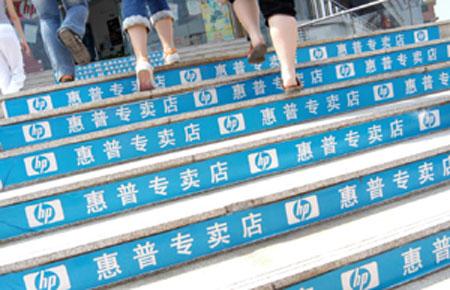
Chinese characters for the Hewlett-Packard logo on the steps of an HP PC franchise store in Guangdong province. HP is expected to face a series of lawsuits this year from Chinese consumers over alleged defective notebook computers. WANG ZHIDE/CHINA FOTO PRESS
BEIJING - US computer maker Hewlett-Packard (HP) may have to face a series of lawsuits this year from Chinese consumers who found their HP notebook computers faulty, according to a lawyer representing more than 170 consumers angry with the company.
It may become the biggest organized consumer action against HP since the company entered China in 1985.
Wang Yufeng, a lawyer at the Yingke Law Firm in Beijing, said his group is preparing to take HP to court later this year.
He said the plaintiffs of the first suit were two HP purchasers in Beijing and the group was also planning to launch a series of lawsuits representing another 15 consumers against the company later this year.
Wang's group has filed a complaint to the General Administration of Quality Supervision, Inspection and Quarantine this month on behalf of more than 170 consumers against HP.
According to figures from Laweach, a not-for-profit website that helped organize laptop users for the case, it has received complaints from more than 1,300 Chinese people who reported their notebook computers had malfunctioning screens and overheating problems. It requests the Chinese government to investigate the case and order HP to launch a recall of the allegedly faulty notebooks.
HP contended in a statement last week that there were some "common symptoms" in certain models of its notebook computers sold in China. But it said the reasons that caused the symptoms varied.
HP said it had offered an extension of warranty periods for some notebook models and urged consumers to contact the company's after-sales team to report the problem.
Xu Wei, one of the angry HP consumers says that is not a thorough solution to the problem. He believes that the problem is a defect in the design and wants HP to give him a new computer.
The 30-year-old employee of a clothing firm in Beijing said he bought an HP laptop V3803 in May 2008 for his wife. Four months later, he found the product often made strange noises and had a severe overheating problem. Later, the screen of the laptop failed to work.
"In the following 18 months I took my laptop to HP six times but they still couldn't solve the problem," said Xu. He said he has lost confidence with HP and plans to launch a lawsuit against the company if his demands are not met.
According to Wang, the problems with HP's product were down to faulty graphics cards produced by Nvidia, a chipmaker which supplies several PC producers.
In July 2008, Nvidia publicly acknowledged quality problems with some graphics cards and announced that it was paying PC makers to deal with resulting problems.
"HP has recalled many products in foreign markets since 2003 but it never did in China," said Wang. He thinks that is "discrimination" towards Chinese consumers. Wang admitted that the lawsuit against HP was a way of attracting attention from the government and the public because China has yet to have any regulations on computer recalls.
According to Yao Haifang, an teacher at the law school in Renmin University, China launched its first recall regulation in 2004 for automobiles and currently only has similar regulations on pharmaceuticals, toys and food products.
But Wang said he hopes they can set a precedent and help strengthen the protection of consumer rights in China.





